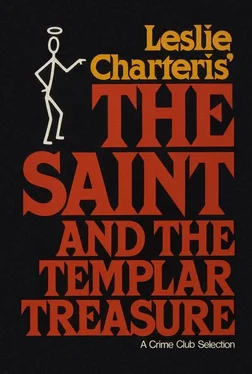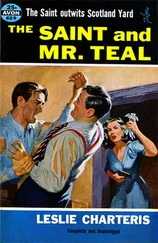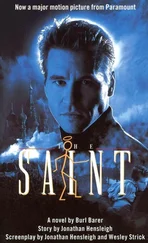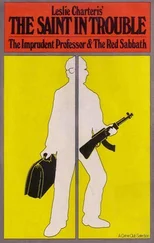The name had produced a creeping sensation across the Saint’s scalp that he could not explain, as if some sixth sense was trying to warn him. But of what? There was nothing really surprising in the fact that he should drink a bottle of local wine and then meet two people on their way to the vineyard that produced it. Just a minor coincidence of course but he could never accept coincidences entirely at their face value, just as years of living on a knife’s edge had taught him never to dismiss the instincts that such an existence had developed.
“Tell me about Château Ingare, Pascal,” he said thoughtfully, and the youth seemed happy to oblige.
“As I said, it is one of the smaller vineyards, but also one of the oldest. It has been in the Florian family for generations — in fact since the fourteenth century. The château itself is one of the most beautiful in the region. It was originally a castle and stands on a hill above the vineyards. From it you can see to the horizon.
“The family settled here around the time the Popes first built their summer palace at Châteauneuf. All this area around Avignon belonged not to France but to the Papacy right up until the Revolution. It was they who planted some of the first vines.”
“Is that why they call Châteauneuf the Pope of wines?” Simon suggested.
“Perhaps; though it wasn’t the wine of Popes, apparently. It is said they preferred Burgundy.”
“I tried a bottle of Château Ingare for the first time today.” The Saint was impelled to keep the conversation going in that direction. “It was excellent. Why haven’t I heard about it before?”
“Yes, it is very good,” Pascal agreed enthusiastically. “But unfortunately it is rarely sold outside this area because only a small quantity is produced and the family do not have the hectares to extend their market.”
“Noble but poor?” Simon prompted. “Do you know the family?”
Pascal wagged his head noncommittally.
“I am sure there is a lot to tell, but I do not know very much of it except that the war almost bankrupted the estate. Monsieur Yves — he is the head of the family — vowed that he would never make wine for the Germans, so every year the grapes were picked and pressed, and every year something happened. One year all the bottles were mysteriously broken, another year the wine was contaminated, and so it went on. Even when the Germans took over the château and billeted their officers there, the accidents continued.”
“That must have been an expensive piece of resistance,” the Saint commented.
“Very expensive. But since the war ended there have been other troubles. There is a legend locally that the Florian family is cursed,” Pascal added hesitantly.
“Vineyard workers are traditionally as superstitious as sailors,” said the Saint with a smile. “And who do they think cursed the family — the Germans?”
Pascal laughed harshly and said: “I think their methods of punishment were more direct. But the curse on the Florian family is supposed to be much older. In fact, it goes back to the Templiers.”
The name, dropped quite casually, sounded in the Saint’s ears like a tocsin.
Whereas a little earlier the recall of Château Ingare had caused only an almost caressing frisson at the roots of his hair, this new association set off a whole jangling of physic alarm bells which no facile scepticism could silence.
For the translation of Templier is “Templar,” and les Templiers is French for what English historians call the Knights Templar — from whom, in the remote past, some ancestor of Simon’s must have taken his patronym.
“The legend is that the castle was built by the Templars, and when they fled it is said they cursed whoever should own it next.”
Although the Saint had always been aware of the historic connotation of his unusual name, he had never taken much interest in the snob sport of ancestor-tracing, and in fact had not even bothered to study the subject of the original Templars. He had a vague idea that they had protected pilgrims on their way to the Holy Land and had fought with distinction in the Crusades. He confessed as much to Pascal without revealing his own identity, and the young student seemed pleased to be given the chance to show off his own erudition.
He explained how they had banded together at the beginning of the eleventh century and had taken their title from the Temple in Jerusalem, swearing to win back the city for the Christians and rebuild the temple. Their bravery in battle and support for the Christian cause had won them the extremely rare privilege of appointing their own bishops and being answerable only to the Pope himself.
“By the end of the thirteenth century there were more than twenty thousand Knights in Europe,” Pascal continued, “and they were the single most powerful organisation on the continent. They owned vast areas of land, paid no taxes, and were often far wealthier than kings. They wore a surcoat with an eight-pointed cross on it which guaranteed them immunity wherever they went, and because they were so powerful they began to be feared.”
The Saint thought of his own emblem of a haloed matchstick figure and the near supernatural awe that it had once inspired among the ranks of the ungodly, before it had become so famous as to be virtually unusable any more.
“Jealousy bred rumours,” Pascal went on. “It was said that initiates had to spit on the Cross, that the Knights were often homosexuals, and that many of them practised black magic. As the Crusades failed, they concentrated on increasing their wealth and power and became generally corrupt.”
“A sort of medieval Mafia,” Simon murmured approvingly.
“In a way, yes. Eventually, under pressure, the Pope outlawed them and they were persecuted throughout Europe. Very many were tortured and burned. In France they were completely wiped out.”
“Was that what happened to the Templars at Château Ingare?”
Pascal shook his head.
“No. They were besieged for many weeks by the King’s army, but somehow most of them escaped just before the walls were breached. That is probably why there are so many legends about the place, for the Knights were never seen again and no one knows where the survivors went.”
At least one of them, the Saint figured, must have found his way to England. He decided that one day he would have to do some more research into his infamous ancestry.
A road sign told him that they were just entering the town of Carpentras, and with a trace of reluctance he inquired: “Which way do you go from here?”
“Château Ingare is to the north, but perhaps that is not your direction.”
Pascal turned and considered his friend, who appeared to have fallen into a light doze. He leaned over and prodded him sharply in the stomach, and the youth stirred and sat up. Pascal turned back to the Saint.
“It is only a few kilometres and I think Jules has had enough rest.”
A low moan of protest from Jules showed that he did not agree with his friend, but the Saint had already made his decision. At the next sign-posted intersection he spun the wheel to the left.
“Since I’ve come this far out of my way, a few more kilometres are not going to make much difference. And they might even let me buy a few bottles to take home with me.”
His tone was matter of fact but his eyes narrowed as he spoke. There was a strange, almost eerie, tingle of excitement beginning to bubble in the pit of his stomach, a tightening of nerves for which there was no logical explanation. He tried to shake off the feeling, but instead it grew stronger as the miles were covered.
Two coincidences involving the Château Ingare could be brushed off; but the third, linking it with his own name, looked too much like the weaving of fate to be fluke. Even in his most determined realism, Simon Templar had an Achilles’ heel for the sense of destiny that had made his life so different from all other lives.
Читать дальше












